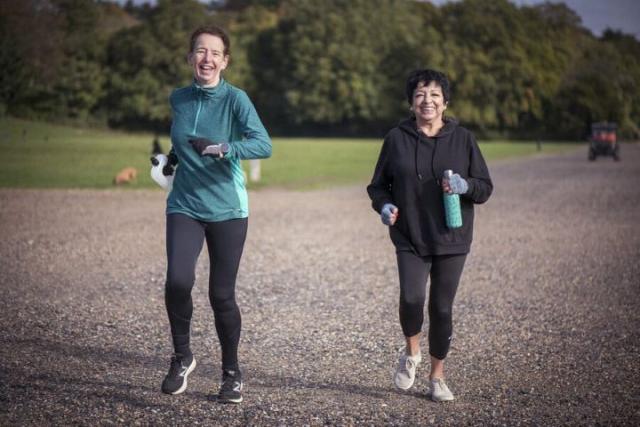
Novel research brings hope for people with heel pain
8 April
Researchers with lived experience of heel pain are investigating the most effective treatments to help people manage the condition, in the hope of helping others in the future.
Mim Evans, a Research Nurse at Cardiff and Vale University Health Board and a busy mum of two, said she would like “to use the jewel” of her experience to help people manage debilitating heel pain, which she herself developed three years ago.
Mim said: “The pain just came on suddenly, I couldn't walk or put pressure on my foot fully. When I put my foot out of bed first thing in the morning, it would be really painful.
“I'm constantly on my feet. When I had severe pain, it was quite debilitating.
“When I changed the way I walked and tried to take the pressure off my heels, it would then cause hip pain. It's not very pleasant at all.”
Mim is working with Dr Nia Jones, a qualified Podiatrist, on a study funded by Health and Care Research Wales looking into treatment pathways that would work best for people with heel pain.
“As a research nurse, the enjoyable part of the job is being able to spend quality time with patients going through the research project thoroughly with them, ensuring that they understand their commitment to the research project.
“From a patient point of view, they appreciate talking to someone with lived experience and understanding how intense the pain is.
“It's a meaningful project and at the end of it, we will find out the best treatments for heel pain and get that across to people.”
Dr Nia Jones said almost one in ten people have experienced plantar fasciitis, also known as plantar heel pain, and it is more common among middle-aged or older adults.
Dr Jones said: “Existing treatments for plantar heel pain include self-help videos, exercise advice, shoe insoles and ultrasound therapy. Each treatment could help patients to reduce pain, but may work better for some people than others.
“In our study, we will look at the whole patient pathways instead of individual treatment. We are going to recruit patients for a trial and they will be allocated to one of four different treatment pathways randomly.
“It is a novel experimental design where patients may be randomised multiple times; we want to find out which sequence of treatment outcomes are the most feasible and acceptable to them.
“Plantar heel pain can be a massive burden to people, affecting their health and wellbeing and leading to a reduction in quality of life.
“We are using a holistic approach to look not just at the feasibility side of it, but from the wider impact of what the condition can manifest. We aim to scale up this project to look at the effectiveness in a larger trial.”